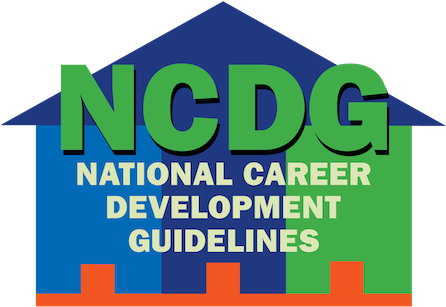
Search Domains, Goals, & Indicators
The Framework and its uses
The NCDG is a framework of career development competencies and indicators of mastery, including a recommended strategy for implementing career development programs for youth or adults.
Domains, goals and indicators organize the NCDG framework. The three domain names have been updated to reflect 21st Century terminology:
- Career Development (CD)
- formerly named Career Management
- defined as meeting career goals through information management and decision-making, while mastering employability skills and integrating world conditions
- Academic and Lifelong Learning (ALL)
- formerly Educational Achievement and Lifelong Learning
- defined as integrating foundational and on-going learning methods and experiences in the pursuit of one’s goals and to function in a diverse, dynamic work world
- Social Emotional Learning (SEL)
- formerly Personal Social Development
- defined as the process of acquiring and applying knowledge, skills and attitudes to learn, grow and thrive in life
The eleven goals define broad areas of career development competency. Under each goal in the framework are indicators of mastery that highlight the knowledge and skills needed to achieve that goal. Each indicator is presented in three learning stages derived from Bloom’s Taxonomy: knowledge acquisition, application and reflection. The stages describe learning competency. They are not tied to an individual’s age or level of education.
- Knowledge Acquisition (K). Youth and adults at the knowledge acquisition stage expand knowledge awareness and build comprehension. They can recall, recognize, describe, identify, clarify, discuss, explain, summarize, query, investigate and compile new information about the knowledge.
- Application (A). Youth and adults at the application stage apply acquired knowledge to situations and to self. They seek out ways to use the knowledge. For example, they can demonstrate, employ, perform, illustrate and solve problems related to the knowledge.
- Reflection (R). Youth and adults at the reflection stage analyze, synthesize, judge, assess and evaluate knowledge in accord with their own goals, values and beliefs. They decide whether or not to integrate the acquired knowledge into their ongoing response to situations and adjust their behavior accordingly.
The NCDG framework has a simple coding system to identify domains, goals, indicators and learning stages. The coding system makes it easy to use the NCDG for program development and to track activities by goal, learning stage and indicator. However, users do not need to know or include the codes to use the NCDG framework.
This website section offers a listing of domains, goals, indicators of mastery and more. It will grow as more users contribute examples from their experience.
Users may also download a PDF of the NCDG 2024 Framework.
Using the Framework
The NCDG framework provides a foundation for creating, reviewing, and informing a variety of career development areas and stakeholders. Below are a few ideas.
Counselors, career practitioners, administrators and media specialists, as well as legislative policy makers, may consider the following possibilities for using the framework:
- to craft a new competency-based career development program for youth or adults
- to review an existing career development program for students or adults to see what competencies are covered and where the gaps are
- to craft needs assessments for youth and adults
- to develop a program evaluation and accountability plan
- to review materials and resources on hand or those being considered for purchase
- to inform the development of professional standards, accreditation, certification and legislation and policy at both the national and state levels
Others may use the framework in the following ways:
- Youth and adults can use the goals and indicators as an informal checklist to determine areas of competency and gaps that need attention
- Parents, guardians, spouses, or family members can use the framework to better understand how to help someone with career development questions
- Teachers and higher education professionals can use the framework to review their curriculum and existing lessons for career development connections
- Teachers and higher education professionals can use the framework to write new lessons that enhance academic rigor by infusing career development concepts
- Graduate students can study the framework to gain an understanding of use of standards or as a resource, when working with diverse populations
- Mental health professionals can support the career development needs of their clients
- The framework can serve as the basis for staff development workshops offered locally, statewide, or regionally
- Product developers can use the framework to target their materials to meet specific career development needs of potential customers
- Professional organizations can refer to the framework as they develop resources for their members
If you would like to share other suggested uses of the Framework, please email webeditor@ncda.org

